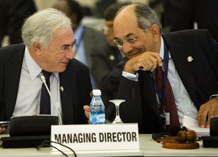
Typical street scene in Santa Ana, El Salvador. (Photo: iStock)
IMF Survey: IMF Countries Back Recovery Moves, Governance Reforms
October 4, 2009
- IMFC backs governance reform of the International Monetary Fund
- Calls for revision of IMF’s mandate to reflect new role
- Says members ready to “revive credit, recover lost jobs”
The policy steering committee of the International Monetary Fund, meeting in Istanbul with the world economy now on a recovery path, committed to maintaining stimulative policies until recovery is assured and backed moves to reform governance of the Fund to give greater voice to dynamic emerging markets and developing countries.

Strauss-Kahn (left) speaks to IMFC Chairman Youssef Boutros-Ghali, the Egyptian Finance Minister, during the policy committee’s meeting (photo: IMF)
IMFC meeting
In a communiqué, the International Monetary and Financial Committee (IMFC), chaired by Youssef Boutros-Ghali, the Egyptian Finance Minister, said IMF members were ready to act further “to revive credit, recover lost jobs, and reverse setbacks in poverty reduction.”
The 24-member IMFC emphasized that agreed financial sector and regulatory reforms should be completed without delay and called for the Fund to develop a new, more comprehensive mandate to reflect its more central role in the global economy.
Backing for G-20 plans
The IMFC, which provides policy guidance to the 186-member Fund, met as part of the Annual Meetings of the IMF and the World Bank being held in Istanbul, Turkey. The Meetings are taking place just after the summit of leaders of the Group of Twenty (G-20) industrialized and emerging market economies in Pittsburgh on September 25.
The G-20 leaders provided political support for a shift in country representation at the IMF of at least 5 percent toward dynamic emerging market and developing countries. They also had pledged to sustain the strong policy response to counter the global economic crisis.
Building on the decisions of the Group of Twenty, the IMFC called on the Fund to assist the G-20 countries with the agreed mutual assessment of their economies by developing a forward-looking analysis of whether policies are collectively consistent with more sustainable and balanced trajectories for the global economy.
IMF Managing Director Dominique Strauss-Kahn said the Meetings were a unique opportunity to shape the post-crisis world. He pressed his idea that the Fund should become a global lender of last resort, including by providing a pool of reserves so that countries would not have to build up excessively large reserves of their own, or “self-insure” in case of a crisis.
The IMFC said the Fund should consider whether there is a need for enhancing financing instruments and whether this can offer credible alternatives to self-insurance, while preserving adequate safeguards. “We also call on the Fund to study other policy options to promote long-term global stability and the proper functioning of the international monetary system.”
Fund mandate and governance reforms
Boutros-Ghali said the IMFC discussed reform of the IMF, with the aim of giving it “a clearing house function for the (economic) policies of the world.”
The IMF had played a central role in combating the crisis. Now the Fund needed to evolve to reflect its more central role by
• Drawing up a new mandate for the IMF, codifying its role in the global economy; and
• Making progress on governance reform to make the institution more legitimate and effective.
The IMFC called on the Fund to undertake a review covering full range of macroeconomic and financial sector policies that bear on global stability, and to report back to the Committee by the time of the next Annual Meetings.
Echoing the G-20, the committee said the IMF should remain a quota based organization that reflects the relative weights of members in the global economy.
It recognized that these weights have changed substantially in recent years and backed a shift in representation toward dynamic emerging markets and developing countries to be agreed by January 2011. The G-20 has proposed a shift of five percent from over-represented countries to under-represented. Together with the earlier quota reform agreed in 2008, Strauss-Kahn said this would mean an eventual shift in weightings of 7.7 percent.
Issues covered at the IMFC included:
• Sharper review of the financial sector. The committee asked the IMF to begin implementing rapidly a new flexible framework for the Financial Sector Assessment Program (FSAP), and to ensure that it can deliver sharper macro-financial surveillance and better integration into bilateral surveillance.
• Stronger surveillance. “We encourage further strengthening cross-country, regional, and multilateral surveillance, and look forward to the review and enhancement of the Fund’s transparency policy. We endorse updated Surveillance Priorities, and call on members to work with the Fund in achieving its goals.”
• Early warning exercise. The IMFC was shown how the Fund is assessing potential vulnerabilities in the global economy. “The idea of the early warning exercise is not predicting crises. The idea is, in effect, to look in a multilateral framework at the stresses in the global system,” said John Lipsky, First Deputy Managing Director.
• Strengthening IMF resources. The IMFC thanked members that have committed temporary resources to the Fund, allowing more than a tripling of its lending capacity in response to the crisis, and welcome the expected agreement on a renewed and more flexible borrowing arrangement expanded by over $500 billion.
• Reduce excessive reserve accumulation. The IMFC said the Fund should continue to strengthen its capacity to help its members cope with balance of payments problems, including financial volatility, and reduce the perceived need for excessive reserve accumulation. The committee asked the Fund to report back at the next Annual Meetings about the future financing role of the IMF, including building on the success of the Flexible Credit Line (FCL).
Comments on this article should be sent to imfsurvey@imf.org


